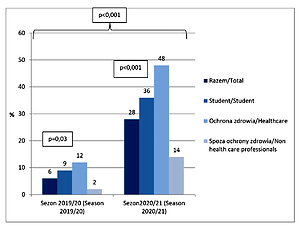Online first
Bieżący numer
O czasopiśmie
Archiwum
Polityka etyki publikacyjnej
System antyplagiatowy
Instrukcje dla Autorów
Instrukcje dla Recenzentów
Rada Redakcyjna
Bazy indeksacyjne
Komitet Redakcyjny
Recenzenci
2024
2023
2022
2021
2020
2019
2018
Kontakt
Klauzula przetwarzania danych osobowych (RODO)
PRACA ORYGINALNA
Zachowania mające na celu wzmocnienie odporności w okresie pandemii COVID-19
1
Zakład Epidemiologii, Katedra Epidemiologii i Biostatystyki, Wydział Nauk o Zdrowiu w Bytomiu, Śląski Uniwersytet Medyczny w Katowicach, Polska
2
Studenckie Koło Naukowe przy Zakładzie Epidemiologii, Wydział Nauk o Zdrowiu w Bytomiu, Śląski Uniwersytet Medyczny w Katowicach, Polska
Autor do korespondencji
Agata Wypych-Ślusarska
Zakład Epidemiologii, Katedra Epidemiologii i Biostatystyki, Wydział Nauk o Zdrowiu w Bytomiu, Śląski Uniwersytet Medyczny w Katowicach, ul. Piekarska 18, 41-902, Bytom, Polska
Zakład Epidemiologii, Katedra Epidemiologii i Biostatystyki, Wydział Nauk o Zdrowiu w Bytomiu, Śląski Uniwersytet Medyczny w Katowicach, ul. Piekarska 18, 41-902, Bytom, Polska
Med Srod. 2021;24(1-4):5-10
SŁOWA KLUCZOWE
DZIEDZINY
STRESZCZENIE
Wprowadzenie i cel:
Profilaktyka zakażenia Sars-CoV-2 polega przede wszystkim na działaniach ograniczających rozprzestrzenianie się wirusa. Jednak wiele osób podejmowało działania mające na celu poprawę działania układu immunologicznego. Celem pracy była ocena indywidualnych zachowań mających na celu wzmacnianie odporności w czasie pandemii COVID-19.
Materiał i metody:
Badanie zostało przeprowadzone w 2020 roku w grupie 245 dorosłych Polaków: 208 kobiet (84,9%) i 37 mężczyzn (15,1%). Respondenci wypełnili za pośrednictwem Internetu autorski kwestionariusz dotyczący aktywności fizycznej, częstości spożycia wybranych produktów i stosowanej suplementacji, a także zachowań profilaktycznych w związku z pandemią COVID-19. Analiza statystyczna została przeprowadzona w programie Statistica 13.0. Dla oceny różnic pomiędzy grupami zastosowano test chi², przyjęto poziom statystycznej znamienności p < 0,05.
Wyniki:
Zaobserwowano statystycznie istotny wzrost liczby osób (p < 0,001), które zaszczepiły się przeciwko grypie w bieżącym sezonie (6,0% w sezonie 2019/2020 vs 28,0% w sezonie 2020/2021). Osoby związane z ochroną zdrowia szczepiły się najczęściej (48% vs 36% studentów i 14% osób niezwiązanych z sektorem zdrowia), a różnice między grupami w obu analizowanych okresach były statystycznie istotne. Probiotyki przyjmowało 9,0% badanych, 56,7% suplementowało witaminę D3, a 38,0% witaminę C.
Wnioski:
Działania profilaktyczne w badanej grupie osób ukierunkowane były na szczepienia ochronne oraz doraźną suplementację witamin: D i C. Odsetek zaszczepionych był wyższy wśród osób pracujących w sektorze ochrony zdrowia.
Profilaktyka zakażenia Sars-CoV-2 polega przede wszystkim na działaniach ograniczających rozprzestrzenianie się wirusa. Jednak wiele osób podejmowało działania mające na celu poprawę działania układu immunologicznego. Celem pracy była ocena indywidualnych zachowań mających na celu wzmacnianie odporności w czasie pandemii COVID-19.
Materiał i metody:
Badanie zostało przeprowadzone w 2020 roku w grupie 245 dorosłych Polaków: 208 kobiet (84,9%) i 37 mężczyzn (15,1%). Respondenci wypełnili za pośrednictwem Internetu autorski kwestionariusz dotyczący aktywności fizycznej, częstości spożycia wybranych produktów i stosowanej suplementacji, a także zachowań profilaktycznych w związku z pandemią COVID-19. Analiza statystyczna została przeprowadzona w programie Statistica 13.0. Dla oceny różnic pomiędzy grupami zastosowano test chi², przyjęto poziom statystycznej znamienności p < 0,05.
Wyniki:
Zaobserwowano statystycznie istotny wzrost liczby osób (p < 0,001), które zaszczepiły się przeciwko grypie w bieżącym sezonie (6,0% w sezonie 2019/2020 vs 28,0% w sezonie 2020/2021). Osoby związane z ochroną zdrowia szczepiły się najczęściej (48% vs 36% studentów i 14% osób niezwiązanych z sektorem zdrowia), a różnice między grupami w obu analizowanych okresach były statystycznie istotne. Probiotyki przyjmowało 9,0% badanych, 56,7% suplementowało witaminę D3, a 38,0% witaminę C.
Wnioski:
Działania profilaktyczne w badanej grupie osób ukierunkowane były na szczepienia ochronne oraz doraźną suplementację witamin: D i C. Odsetek zaszczepionych był wyższy wśród osób pracujących w sektorze ochrony zdrowia.
Introduction and objective:
Prevention of Sars-CoV-2 infection aims primarily on actions to limit the spread of the virus. However, many people have taken steps to improve the functioning of the immune system. The aim of the study was to assess individual behaviours strengthening immunity during the COVID-19 pandemic.
Material and methods:
The study was conducted in 2020, in a group of 245 adult Poles: 208 females (84.9%) and 37 males (15.1%). The respondents completed an author constructed questionnaire via the Internet concerning physical activity, the frequency of consumption of selected products and dietary supplements used, as well as preventive behaviours in connection with the COVID-19 pandemic. Statistical analysis was carried out using the Statistica 13.0. The chi-square test was used to evaluate the differences between groups; the level of statistical significance was set at p<0.05.
Results:
A statistically significant increase was observed in the number of respondents (p <0.001) who were vaccinated against influenza in the current season (6.0% in 2019/20 vs. 28.0% in 2020/21). Respondents associated with health care were most frequently vaccinated (48% vs. 36% of students and 14% of those not related to the health sector), and the differences between groups in both analyzed periods were statistically significant. Probiotics were taken by 9.0% of respondents, 56.7% supplemented vitamin D3, and 38.0% vitamin C.
Conclusions:
Prophylactic activities in the studied group focused on vaccinations and immediate supplementation of vitamins: D and C. The percentage of vaccinated persons was higher among those working in the health sector.
Prevention of Sars-CoV-2 infection aims primarily on actions to limit the spread of the virus. However, many people have taken steps to improve the functioning of the immune system. The aim of the study was to assess individual behaviours strengthening immunity during the COVID-19 pandemic.
Material and methods:
The study was conducted in 2020, in a group of 245 adult Poles: 208 females (84.9%) and 37 males (15.1%). The respondents completed an author constructed questionnaire via the Internet concerning physical activity, the frequency of consumption of selected products and dietary supplements used, as well as preventive behaviours in connection with the COVID-19 pandemic. Statistical analysis was carried out using the Statistica 13.0. The chi-square test was used to evaluate the differences between groups; the level of statistical significance was set at p<0.05.
Results:
A statistically significant increase was observed in the number of respondents (p <0.001) who were vaccinated against influenza in the current season (6.0% in 2019/20 vs. 28.0% in 2020/21). Respondents associated with health care were most frequently vaccinated (48% vs. 36% of students and 14% of those not related to the health sector), and the differences between groups in both analyzed periods were statistically significant. Probiotics were taken by 9.0% of respondents, 56.7% supplemented vitamin D3, and 38.0% vitamin C.
Conclusions:
Prophylactic activities in the studied group focused on vaccinations and immediate supplementation of vitamins: D and C. The percentage of vaccinated persons was higher among those working in the health sector.
REFERENCJE (24)
1.
Serwis Rzeczypospolitej Polskiej. Koronawirus: Informacje i zalecenia. Raport zakażeń koronawirusem (SARS-CoV-2). https://www.gov.pl/web/koronaw... (access: 2021.09.08).
2.
European Centre for Disease Prevention and Control. COVID-19 situation update worldwide. https://www.ecdc.europa.eu/en/... (access: 2021.09.08).
3.
Gołąb J, Jakóbisiak M, Lasek W, et al. Immunologia. Warszawa: Wydawnictwo PWN; 2020.
4.
Galmés S, Serra F, Palou A. Current State of Evidence: influence of nutritional and nutrigenetic factors on immunity in the COVID-19 pandemic framework. Nutrients 2020; 12(9): 2738. https://doi.org/10.3390/nu1209....
5.
Panyod S, Ho C, Sheen L. Dietary therapy and herbal medicine for COVID-19 prevtion: a review and perspective. J Tradit Complement Med. 2020; 10(4): 420–427. https://doi.org/10.1016/j.jtcm....
6.
Aman F, Masood S. How nutrition can help to fight against COVID-19 pandemic. Pak J Med. Sci. 2020; 36(COVID19-S4): S121–S123. https://doi.org/10.12669/pjms.....
7.
Jampilek J, Kralova K. Potential of nanonutraceuticals in increasing immunity. Nanomaterials (Basel) 2020; 10(11): 2224. https://doi.org/10.3390/nano10....
8.
Iddir M, Brito A, Dingeo G. Strengthening the immune system and reducing inflammation and oxidative stress through diet and nutrition: considerations during the COVID-19 crisis. Nutrients. 2020; 12(6): 1562. https://doi.org/10.3390/nu1206....
9.
Rusińska A, Płudowski P, Walczak M, et al. Zasady suplementacji i leczenia witaminą D – nowelizacja 2018. Postępy Neonatol. 2018; 24(1): 1–24. doi: 10.31350/postepyneonatologii/2018/1/PN2018001.
10.
BourBour F, Dahka S, Gholamalizadeh M, et al. Nutrients in prevention, treatment, and management of viral infections; special focus on coronavirus. Arch Physiol Biochem. 2020; 9: 1–10. https://doi.org/10.1080/138134....
11.
Yang F, Zhang Y, Tariq A, et al. Food as medicine: a possible preventive measure against coronavirus disease (COVID-19). Phytother Res. 2020; 34(12): 3124–3136. https://doi.org/10.1002/ptr.67....
12.
Moghaddam A, Heller R, Sun Q, et al. Selenium deficiency is associated with mortality risk from COVID-19. Nutrients. 2020; 12(7): 2098. https://doi.org/10.3390/nu1207....
13.
Junaid K, Ejaz H, Abdalla A, et al. Effective immune functions of micronutrients against SARS-CoV-2. Nutrients. 2020; 12(10): 2992. https://doi.org/10.3390/nu1210....
14.
Centrum Badania Opinii Społecznej. CBOS- Opinie o epidemii koronawirusa i związanych z nią restrykcjach. Komunikat z badań nr 58/2020. https://www.cbos.pl/SPISKOM.PO... (access: 2021.05.20).
15.
Rachul C, Marcon AR, Collins B, et al. COVID-19 and ‘immune boosting’ on the Internet: a content analysis of Google search results. BMJ Open. 2020; 10:e040989. http://dx.doi.org/10.1136/bmjo....
16.
Wagner D, Marcon A, Caulfield T. “Immune Boosting” in the time of COVID: selling immunity on Instagram. Allergy, Asthma Clin. Immunol. 2020; 16(1). https://doi.org/10.1186/s13223....
17.
Parfin A, Wdowiak K, Furtak-Niczyporuk M, et al. An influence of social isolation on the level of physical activity as well as on well-being and mental state of people during the coronavirus COVID-19 pandemic. Pol J Public Health 2020; 129(4): 127–131. https://doi.org/10.2478/pjph-2....
18.
Caputo E, Reichert F. Studies of physical activity and COVID-19 during the pandemic: a scoping review. J Phys Act Health. 2020; 17(12): 1275–1284. https://doi.org/10.1123/jpah.2....
19.
Lesser I, Nienhuis C. The impact of COVID-19 on physical activity behavior and well-being of Canadians. Int J Environ Res Public Health. 2020; 17(11): 3899. https://doi.org/10.3390/ijerph....
20.
Ammar A, Brach M, Trabelsi K, et al. Effects of COVID-19 home confinement on eating behaviour and physical activity: results of the ECLB-COVID19 International Online Survey. Nutrients. 2020; 12(6): 1583. https://doi.org/10.3390/nu1206....
21.
Grant W, Lahore H, McDonnell S, et al. Evidence that vitamin d supplementation could reduce risk of influenza and Covid-19 infections and deaths. Nutrients. 2020: 12: 988. https://doi.org/10.3390/nu1204....
22.
Ilie P, Stefanescu S, Smith L. The role of vitamin D in the prevention of coronavirus disease 2019 infection and mortality. Aging Clin Exp Res. 2020; 32:1195–1198. https://doi.org/10.1007/s40520....
23.
Hiedra R, Bryan Lo K, Elbashabsheh M, et al. The use of IV vitamin C for patients with COVID-19: a case series. Expert Rev Anti Infect Ther. 2020; 18 (12): 1259–1261, https://doi.org/10.1080/147872....
24.
Narodowy Instytut Zdrowia Publicznego-Państwowy Zakład Higieny. Szczepienia zalecane dla pracowników ochrony zdrowia. https://szczepienia.pzh.gov.pl... (access: 2021.09.20).
Udostępnij
ARTYKUŁ POWIĄZANY
Przetwarzamy dane osobowe zbierane podczas odwiedzania serwisu. Realizacja funkcji pozyskiwania informacji o użytkownikach i ich zachowaniu odbywa się poprzez dobrowolnie wprowadzone w formularzach informacje oraz zapisywanie w urządzeniach końcowych plików cookies (tzw. ciasteczka). Dane, w tym pliki cookies, wykorzystywane są w celu realizacji usług, zapewnienia wygodnego korzystania ze strony oraz w celu monitorowania ruchu zgodnie z Polityką prywatności. Dane są także zbierane i przetwarzane przez narzędzie Google Analytics (więcej).
Możesz zmienić ustawienia cookies w swojej przeglądarce. Ograniczenie stosowania plików cookies w konfiguracji przeglądarki może wpłynąć na niektóre funkcjonalności dostępne na stronie.
Możesz zmienić ustawienia cookies w swojej przeglądarce. Ograniczenie stosowania plików cookies w konfiguracji przeglądarki może wpłynąć na niektóre funkcjonalności dostępne na stronie.



